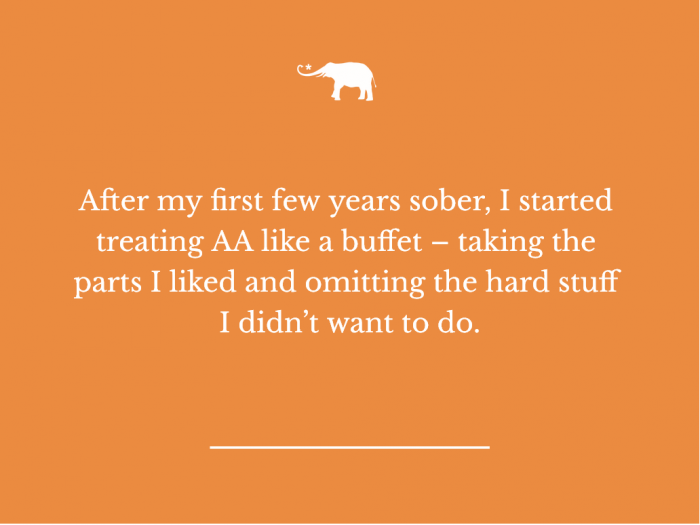I have spent the majority of my life in the meeting rooms of Alcoholics Anonymous. Since I was first sent to rehab at 17, Twelve Step programs have been a backdrop of my life. In 1999, at the age of 22, I put down alcohol and drugs for good.
When I was in the early years of recovery, I had certain boundaries in place that kept me strong in my recovered life. Abstaining from drugs and alcohol was the hardest line I drew that separated my drunk and sober self, and the most obvious one.
There were other things I did to take care of myself. I was careful to not eat anything with alcohol that was not cooked out. No tiramisu for me. I was forthright with telling any doctor that I was a recovering drug addict so that I wouldn’t be prescribed anything habit-forming, or, if it was medically necessary, I would take steps to be accountable to someone else by monitoring my use to ensure I took the meds as prescribed.
I was also into healthy living, and at times would take herbal tinctures. Some of these contained alcohol as a preservative. I learned I could pour a bit of boiling water onto the dose I was about to take and that would evaporate the alcohol.
Around five years sober, kombucha became mass produced. I tried it and liked the effect more than the taste, so decided immediately it was not a good idea for me to drink it.
All of these things were ways that I navigated life, keeping myself safe as an alcoholic and addict. I knew the nature of addiction – that it would never go away no matter how long I abstained. That if I ever drank or drugged again, I would use as I always used – addictively. Moderate drinking or drug use is just not how I do things and that would never change.
However, as the years of recovery grew, I gradually fell into a common trap. On some level, I believed that my time sober was a sort of insurance against relapse. That my clean time gave me power. That I could trust myself around these gray areas.
Justifications and Rationalizations
This amnesia regarding my powerlessness played out very slowly over the years. I stopped telling doctors I was in recovery. I rationalized that I could handle it if I needed a mind-altering medication. I also felt safer taking things I would never have considered in the early years. Getting dental work, I didn’t hesitate to take the pain meds and thought of it as a freebie because it was necessary, but I didn’t even try to manage the pain with a non-narcotic first.
A friend in recovery drank kombucha, so I justified that I could start drinking it, too.
I quit dousing my tinctures with boiling water, rationalizing that the small amount of alcohol wouldn’t affect me. In 2018, I did a health detox that used tinctures. As I was about to take the last dose of the tincture at the end of the cleanse, I saw I had quite a bit of the bottle left. Not wanting to waste it, I took the rest of it with some water. The buzz was instant. I felt very woozy for an hour or so from the alcohol. I was scared that it would trigger me to want to get drunk and knew I had to tell on myself because secrets keep me sick. Of course, a small part of me enjoyed it, but I was too terrified to acknowledge that. I didn’t want to catastrophize the event and say it was a relapse. I was afraid if I reset my sobriety date I’d go and give myself a real reason to start over. So I shared about it to a friend in recovery, who agreed it was a mistake and no need to do anything crazy like a full restart to my sobriety date. So I chalked it up to lesson learned, and vowed I’d not do anything like that again.
At this time, I was living in Ubud, Bali, one of the world’s New Age capitals. Shamanism, yoga, polyamory, and tantra abounded, along with many forms of plant medicine – woo-woo code for psychedelics done in spiritual ceremony. I rationalized that I would not seek it out, but if an opportunity to do plant medicine came to me, I would consider it. It happened twice, a year apart – I participated in ceremonies and consumed psychedelics. I justified it saying it was not to get high and it was for spiritual reasons. After all, didn’t Bill W., AA’s founder, take LSD in his sobriety?
These 3 events felt like smudges on my sobriety – the tincture buzz and the psychedelics. Not that I had intentionally set out to get drunk or high, but there was a small part of me that didn’t feel 100% kosher about it.
In recent years, I developed an anxiety disorder. Knowing that anti-anxiety meds are off-limits as they are extremely addictive, besides the fact that I loved taking them when I was using, I have managed best I could with mindfulness and non-medical intervention. In 2019, I learned about the herb kratom. Native to Indonesia, it is a potent herb for pain relief, energy, and anxiety. I knew it was controversial for people in recovery as it binds to opiate receptor sites in the brain, but I rationalized trying it as I was fed up with living with anxiety. I took it a few times and it gave me a bad headache, and then hours later, energy. After the third try, I decided to just keep it for emergencies. Anxiety emergencies, I guess.
About six months ago, someone told me that they took kratom with coffee for energy. Along with anxiety, I have struggled with fatigue. So when a few days later I woke up feeling especially groggy, I justified putting some kratom in my morning coffee. Awhile later, I felt both energized and a bit woozy. Too woozy. I swore off kratom at that time and gave the rest of what I had away. Because I wasn’t trying to get high, I wasn’t comfortable while I was buzzed by it, and that I would never do it again, this made it okay in my mind.
In all of these examples, I never felt totally comfortable with what I was doing, but I was under the illusion that I could handle it, due to my years clean and sober; that these years had given me the life experience to – dare I say it – control myself. Even though I have been in and around AA for 26 years, I still fell victim to this belief. It had crept up on me so slowly, infiltrating my mind as the years went on, that I wasn’t fully aware it was there. Until recently.
Restored to Sanity
Earlier this year, I rediscovered AA and the 12 Steps as outlined in the book Alcoholics Anonymous. I was introduced to a new way of seeing the program. I had worked the steps a handful of times over the years in different ways. I even did a Big Book (the nickname for the book Alcoholics Anonymous) study 20 years ago. Part of the program of action in the Steps is working with others in AA and helping them do the Steps. I never was keen on it, and saw it as an optional part of the program. After my first few years sober, I started treating AA like a buffet – taking the parts I liked and omitting the hard stuff I didn’t want to do.
This led me, over the years, to be doing nothing but going to meetings sporadically when I felt I needed them. I did step work in a few different 12-Step programs when other behavioral addictions desperately burdened me, but I never got through the entire 12 Steps. I sponsored a handful of people over the years, but always felt uncomfortable and insecure.
This is the state of mind I was in when the Big Book study found me earlier this year. I learned that sponsorship as it’s understood in meetings is not in the Big Book, along with many other ideas. Getting clear on the message from the original founders and following their example has revolutionized my life and has caused me to have many shifts in perception.
The biggest return to sanity I’ve experienced so far is clarity around this insane idea that my sober time gave me some sort of power over my addiction. During a book study, I had a revelation. I saw for the first time that things in my early recovery days that were not okay, were now okay, and that this was not okay. The tinctures, the medication stuff, and of course the psychedelics would never have been acceptable in my first few years clean.
The decision to reset my sobriety date, the date that has defined who I am for over 21 years, did not happen overnight. It was a process. When I first discussed it with my sponsor, he did not give me a yes or no answer on resetting it. He told me it was my decision alone. He told me that as we worked in the book, more would be revealed. As we continued in the Big Book study process, I started seeing examples that supported the reset idea. What at first was a definite no, began to be a maybe. I remained willing and open-minded.
It was during our book study 5 days ago, when reading this sentence, that I knew what I needed to do. “By every form of self-deception and experimentation, they will try to prove themselves exceptions to the rule, and therefore nonalcoholic.” This hit me hard in the gut. It described exactly what I had been doing for the bulk of my sobriety. And I had gotten away with it – escaped full-blown relapse. However, I know now, that had I continued the way I was going, eventually I would have justified the ultimate – a drink or a drug.
After the decision to reset, I felt ungrounded and afraid, yet relieved. I chose a new date – the day after I had drank the kratom and coffee – December 9, 2019. I know the date change doesn’t erase my many years of experience being an addict in recovery, but at the same time, my identity as a woman in long-term sobriety is permanently altered by this experience.
However, I know my story is now much more powerful than before, when I was just a woman with 21 years clean and sober. I am a miracle of the program of AA, as outlined in the Big Book, not my program. The Natalie program is intrinsically flawed.
I am so excited for this new chapter of my life and how this message will help others. These gray areas of sober life are not often discussed. Of course, everyone has their own opinions and defines their recovery themselves. I’m not here to judge. I can only share my own experience, strength, and hope, and trust god that my story will, at minimum, evoke contemplation, and for some people, cause a reexamination of their own recovery.
My sponsor told me that my sobriety date really wasn’t important. I know that it’s true, but the ego sure loves the instant respect it can evoke. Quality over quantity is the key. Now, I feel like my 166 days clean and sober hold more value than all the days and years prior. And I am so grateful for these days.
If you need help with an alcohol or drug problem, please reach out. And if you’re in recovery and this message resonates, I’d love to hear from you too.


 Share on bsky
Share on bsky





Read 0 comments and reply